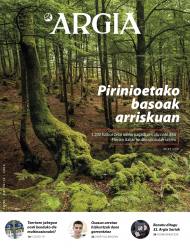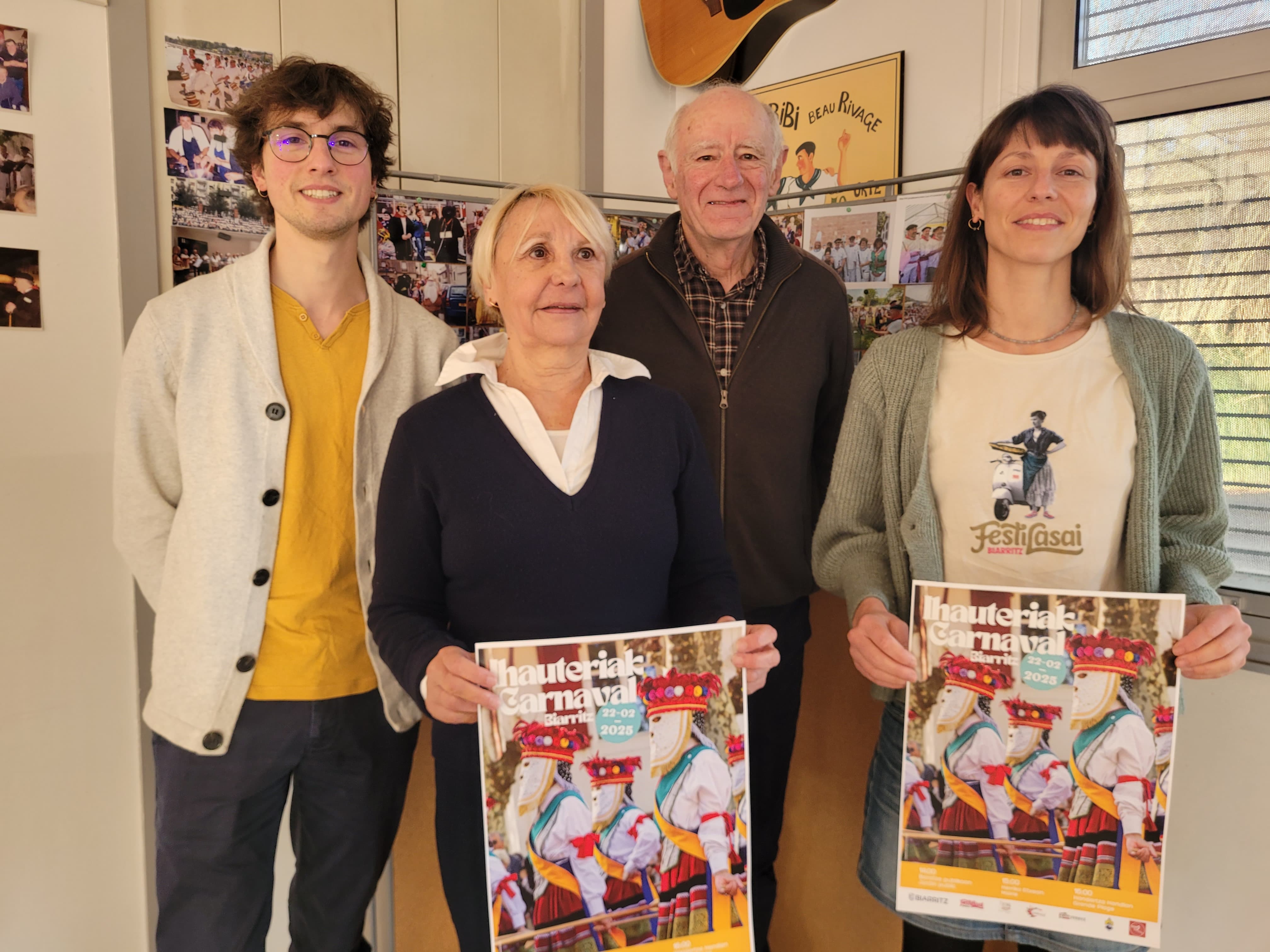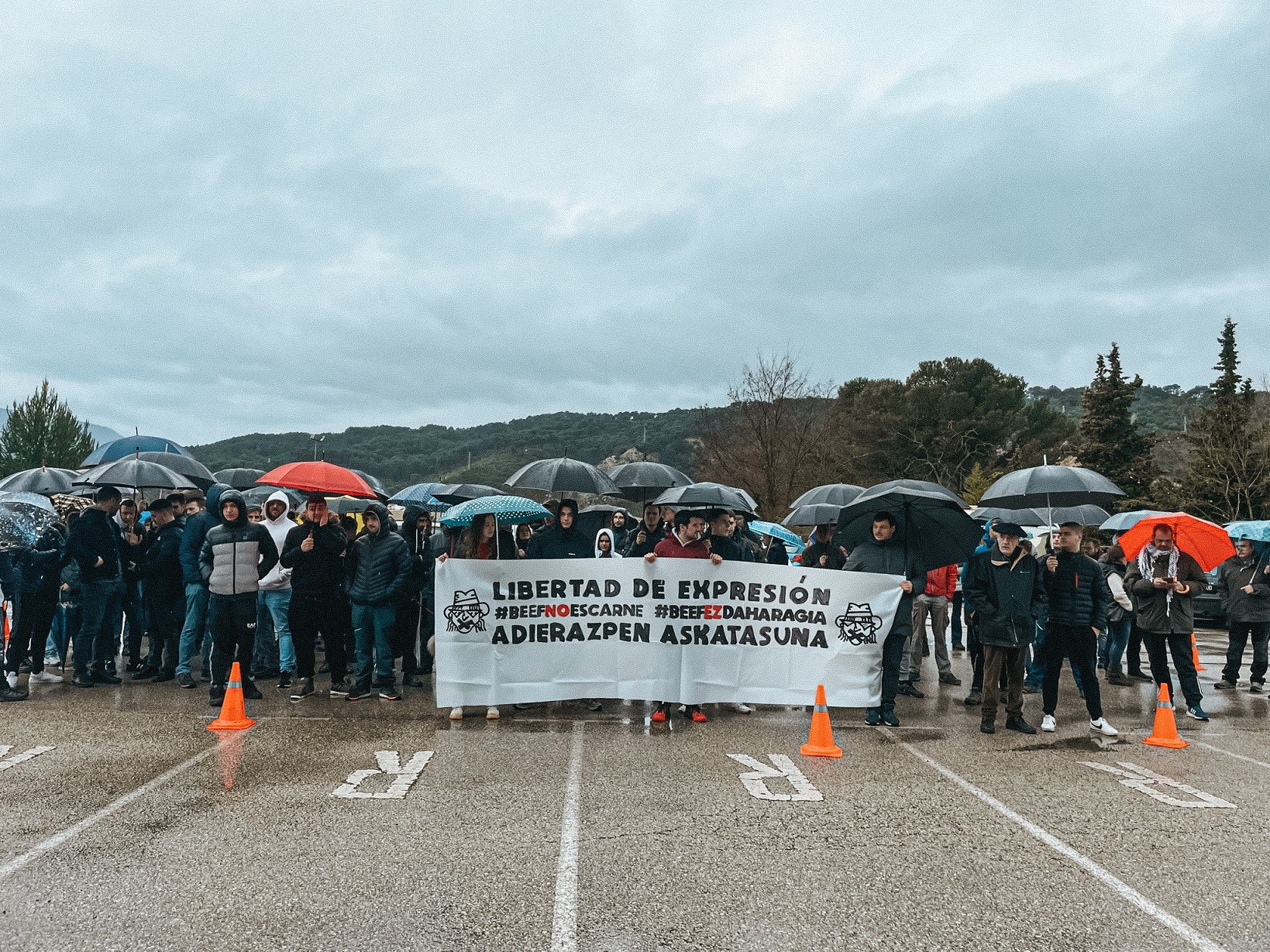"The creators are in a limbo without legal certainty"
- He is a lawyer, but not usual, as he is specialized in cultural advice. At the same time, she is an illustrator and a photographer. He is therefore a creator. She is considered a cultural worker and, by living in the skin of a cultural professional whose rights are insufficient or unknown, she experiences a struggle for her.

Marta C. Dehesa Zuzenbide ikasketak egina, sindikatu bateko abokatu izan zen zenbait urtez, bere gisako kultur aholkularitza sortu zuen arte. Abokatu ezohikoa da: aktibista, sortzaile eta kultur eragile da, eta Mazoka marrazki azokaren kudeatzaile. Komunikazio grafikoa du pasio, argazkilari eta marrazkilari da, eta, ororen gainetik, langile kontzientziaduna: “Ez alferrik naiz langile baten alaba”, esan ohi duenez. Kultur arloko langileei zuzendutako prestakuntza ikastaro eta tailerrak ere gidatzen ditu, aktibismoa hauspotuz, sortzaileen batasuna errebindikatuz, konformagaitza izanez.
You came to tell me you're tired...
Completely exhausted. I see nothing else around me, that is, people are tired and tired. Those of us who work in the cultural field are physically tired and mentally and emotionally overwhelmed. The reasons are obvious and the first is uncertainty. It has been a very hard year, but our situation has long been harsh. We have lived through all kinds of uncertainties: labor, personal and cultural. We do not know what is going to happen in our sector, but I believe that, seeing the value they give to culture, we are on the brink of the precipice, or have been put on us. It's not just how culture is being managed, but how society also considers our work. And on the other hand, there's a tendency to do what it can.
I would believe that whoever can always do what he can.
No. Everyone on their side is not right, we will all lose. Body builders, I mean. We are at the bottom of the pyramid, in danger of losing more, but we are also tired of those in activism. It is not easy, neither in culture nor anywhere, but I mean culture, and how they work in the cultural sphere, whether creative, technical, librarian, museum staff, warehouse clerk… Culture brings together many professionals and moves a lot of money. Culture generates money.
What pocket does that “a lot of money” of culture go to?
I usually guide the workshops and it is the slogan of always: “We live very tight, very precarious.” And it's true that there's a network of creators who live very tight. These creators bring creativity, talent, time -- to society through their work. They are the lower class of culture and live in precarious conditions. However, as far as Gross Domestic Product is concerned, culture moves money, structures, companies and others. In the Spanish State, for example, 5% of GDP is cultural. And remember that in our sector black money is not foreign either. However, 5% is not a small number, but a significant amount of money. In the Spanish State, tourism is the sector that has the most money: 10%.
The percentage generated by culture is to be taken into account, as you say.
And keep in mind that the money of many body builders does not go to that sack, because censuses, headings and so on are not up to date and, therefore, the creators, the self-employed, appear under different headings within Social Security: some, inside tourism; others, in services… But they are musicians, or dancers, or translators, or writers, or whatever.
Excuse me for interrupting you, what are you?
Cultural lawyer and cultural manager, as I organize an illustration fair [Mazoka]. But I'm in Social Security and I'm in "Event Management," and that's for Commerce, and therefore, it's wrong, because I just organize culture. I was referring to that 5%. The pandemic has come and we have all been beaten, both those of us in the stratum below and the cultural agents who live well, as some live at the expense of culture. I'm not talking about known artists, I'm talking about different structures, whether they're editorials, record labels or others. The money is there, not reaching the creator.
"It is better to have class awareness; creators are workers and workers must act together, without competing with each other"
He mentioned publishers and record companies, but, according to them, this pandemic has put them in a difficult situation.
Maybe because they can't contain it. That's another thing, how we, the creators, have to work, and how publishers have to work. There are projects that cannot be maintained. In general, people know that if you keep a project for two years, you're going to make the way. Greater security should it be maintained for five years, although subsequent disasters may also occur. As far as our sector is concerned, we live with day-to-day, both small and large. Not all, but more than one.
Why does that happen of living with the day?Because
in cultural activity there is no medium-term vision. Some are trying to publish forty books to be able to spend the year since the grant was granted to make the same play the following year. I mean, that vicious circle. But not so, publishers have to publish the books with the greatest projection, those who make the way, those who return to foreign languages. Short-term vision takes us nowhere. You have to really edit it. Printing and publishing is not enough. It requires vision. On the other hand, people don't care about culture, and that doesn't help at all either.
But the speech says something else, that culture is an urgent, necessary thing.
Yes, the speech does, but there is no discursive policy, what is said in the words does not move to the normative reality, and that is pointless. There are solutions, of course, but not in the short term. On the other hand, what do politicians want? Photography. Image that will serve you to justify four, or two years. The politician has to sow the seed, knowing that another, ten or fifteen years from now, will receive the harvest. That is not what politicians and cultural leaders are trying to do.
What do you say about the funds that are going to come from Europe? Will they get to culture? As
for that, we are at a very sweet moment, because culture appears on the European agenda: we are at a time of doing the projects well. On the other hand, the agenda of UNESCO’s Sustainable Development Goals also considers culture as an important means of emotionally maintaining society and also as an instrument for combating poverty. Culture is not able to have a good time alone. It is the same, but, above all, we should consider it as important as health. Culture, come on. We have to fight for our governments and administrations to work to raise the awareness of society, and that is not achieved through the drafting of a law or regulation. Having free health services is very important, but as important as that is that the child can read the comic book for free. Children should have free access to culture.
Should the cultural worker also work for free?
No, the fact that children have free access to culture does not mean that we have to work for free. Or subsidized. Because that's what we often have to listen to, that we live subsidized. This year, and at least last year, that speech has changed, or has not been understood. The creators have gone out to the streets to protest or to ask for help, and, for once, nobody has told us that we are subsidized. The moment is not aldrebés: society does not agree, but it is not against us; the European agenda has opened a space for culture, and that means money; we have also heard that through culture we help fight climate change … There are many things in culture, and many things can be done through culture.

Even so, some media outlets have made cultural forecasts for this year. His culture was the concert of the foreign music group, the performance of the famous dance company or the great exhibition of this type of artists.
That doesn't help the creator here, be it a writer, a musician, an illustrator, a technician. It doesn't help the theater cleaner either. We have a cultural view of the show. The show. Many do not distinguish between leisure and culture. Politicians, too often, do not. And among them is a line, a thin line, if you want. The show also serves, it is over!, but the show and culture are not synonymous. A lot of people are working for culture, not for spectacle. If you look at the legal framework, artists are the central axis of culture. And what are the artists? Well, actors and musicians. Non-technicians, for example, or filmmakers quote as artists.
Why have these technicians invented going to the plaza and not published, for example, illustrators and writers?
The technicians have moved very well collectively. We have to ask for solutions from the Administration, of course, but we must also reflect among ourselves, and collectivise them: without behaving at the same time, we have to go all at once, but transversally, because, for example, in the production of books, the writer and the publisher do not have the same interest. What are politicians doing? Everybody gets into the bag of the book and it's over! No, we have to work transversally. Writers and illustrators, for example, will join musicians more easily than publishers. We are workers, some of whom are employed, most of whom are self-employed, self-employed, i.e. those who work and survive. The legislation does not contain any of that, and to correct it we must join together.
As technical staff have gathered.
The technicians have not been towing, they know that they are workers, that they do not have a job if they do not organise performances. Our problem is that, before we become autonomous professionals, we prioritize our vocation. However, we have to know that when we market our work, someone is making money. Let's take any samples at our friend's bar. “It’s my friend, how am I going to charge you!” All right, don't take it, but you do a trick, because that exhibition will give something back to the tabernacle. One of money, another of advertising, or who knows. The technicians, therefore, have come to the streets and we do not, because we do not believe in ourselves, nor in what we do.
Look, the other one!
No, and we have three means to get out of that hole. First of all, we must start by ourselves: we need information, we need to be informed. Not only how we should work, but how the market is, and communication between us is essential for this. Instead, we're used to working alone, thinking alone, communicating with ourselves. That limit must be broken. Secondly, we need ongoing training, we need to know what the tools of the trader are.
“Trader Tools”?
Yes. Common market instruments: budgets, contracts, value of work, how the sector moves... We have to live up to them. It is not enough to fulfill the orders, if you want to have enough money to pay the rent of your house, you have to try. We need information and training. Furthermore, as we are very creative, we are very curious, but we also have to incorporate professional knowledge. Not everything is “to create, to invent, to write, to draw, to play music”. It takes something else to live seemingly and dignibly. That is, you also have to know and use the tools that are essential to be a professional.
You say you need nothing more than create...
Do not hesitate. For example, it has to be connected with its peers, collectivity is very important and, with it, it has a better class consciousness. Creators are workers and workers must act together, without competing with each other. To speak on our behalf, we need to form a collective, to organize ourselves, to form partnerships, because they are the interlocutors, not the individuals or the individuals. It's a matter of creators, organizing it. Who is the Administration talking to? With the entity represented. We therefore need to empower ourselves and, for example, fight for fair copyright against employers in order to achieve intermediate agreements.
And who is going to do that job?
Let me tell you that cultural creators have not recovered from the 2008 crisis. I have been working in this work for ten years, in cultural advocacy and in activism, and it is true that for two or three years I have seen people more aware, wanting to join, wanting and unable to form a union. And in the pandemic situation, I've also seen that people want to move forward. Creators are worried, but in addition to the concern, we need to do a job to move forward.
What about the artist's statute? The Spanish Government already had it, and it has recently been seen whether work is also being done in the Basque Parliament on a proposal ... The
Artist’s Statute… To begin with, it has to be said that the Spanish Government marked the roadmap for developing this status, with a number of written advice and recommendations. However, this statute does not refer to the name “artist”, but to the “Statute of the creator and the professional of culture”. And that's very important, because it's the first time that they recognize the specificity of the sector, that is, the nature of all those who not only work in the environment, but also create. Furthermore, this Statute is aimed at individual natural persons, both employed and self-employed. There are groups that have been left out, including the employers, but, paradoxically, the employers are present at the sectoral tables in which the statute is being negotiated. And that seems to me a problem.
Do you think the employer shouldn't be at those tables?
Your status as a contractor will also be altered. That is true. As is being done now, they have to overcome a sufficient number of knots, complications and bureaucracies, and the Statute will also help to ease those bleeding. The Statute is therefore a set of laws that should cover not only culture, but also finance, social security, work, etc. The majority will be measures or decisions which fall within the Spanish State, but others, on the other hand, seem to me to be able to be adopted in the CAV and in Navarre. And if we recognize that, we would have an immense legal certainty for creators, because we are now without that security, in a limbo. To say that laws must be made in a certain way does not mean that the law is immutable! We will have to work to change the law! And to do so, we need to know the market. Not everything is simply going to trial!
* * * * * * *
HOBBY
“As far as social recognition is concerned, culture is at the bottom of the pyramid. ‘Agriculture, it’s important! Or industry, we absolutely need it!’ And culture is as important as they are, but in society you don't hear that. They consider it our hobby, they do not recognize the value of our work, they do not consider us professionals in any way”.
ADMINISTRATION
“You have to start from education and change your mind. If the humanities are not given importance, how is artistic practice given importance! ? I believe that the administration also has a lot to say, because its practices are, on many occasions, not at all appropriate, not even exemplary, although at the level of discourse they are always in favor of culture”.
EUROPE
“The situation of culture in Europe is different. Not in all countries, but sometimes it is more vigilant than in others. If we look at France’s legal framework and regulation, for example, we would like to see it immediately, although it is not perfect either, and that is precisely why they are trying to correct and improve it.”
LAST WORD
Mazoka
“I make photos and drawings, I manage events, I work to professionalize the cultural sector, I organize the Illustrator Fair, to visualize the world of illustrators. The work of the illustrators is present in books, magazines, streets, traffic lights and house designs. However, society does not know its work and, as it does not know, it does not respect it either. Mazoka wants to correct this error.”
In 2021 we began to hear the first echoes of the Guggenheim Urdaibai project. The then General Manager Unai Rementeria told us that it would be done yes or yes. To reinforce his claims, he left 40 million euros “shielded” by the time the museums were built. There it is!... [+]
Things aren’t easy in fact, and it will be for one reason or another, but lately I’ve bitten my tongue more than I should for these two things: the culture of the sold out and the FOMO – the latter perhaps has to be explained, because it’s not said so many times: the... [+]
Ultra
La Furia
Baga Biga, 2024
---------------------------------------------------------
Cascanteko La Furia-k bosgarren diskoa plazara atera du. Mimoz eta erraietatik, berarentzat funtsezkoak diren osagai horiekin, prestatu du honako pozima, pozoitsua eta aldi berean... [+]
When the dragon swallowed the
sun Aksinja Kermauner
Alberdania, 2024
-------------------------------------------------------
Dozens of books have been written by Slovenian writer Aksinja Kermauner. This is the first published in Basque, translated by Patxi Zubizarreta... [+]
EMEADEDEI + MAHL KOBAT
WHEN: February 2nd.
IN WHICH: In the youth center of Zuia, Murguía.
----------------------------------------------------
On September 20 of last year, we first heard about collective music in the profile of the social network they had just created:... [+]
Epistemology, or theory of knowledge, is one of the main areas of philosophy, and throughout history there have been important debates about the limits and bases of our knowledge. Within this we find two powerful corridors that propose different ways of accessing knowledge: The... [+]
I have recently worked in class on Etxahun Barkox’s beautiful and touching cobla. The bad guy! The afflictions of the house began because of the creation of the “praube with beauty”, but in seventeen years she had entered the sea of misfortune, having to abandon the girl... [+]

















.jpg)



